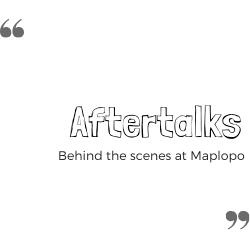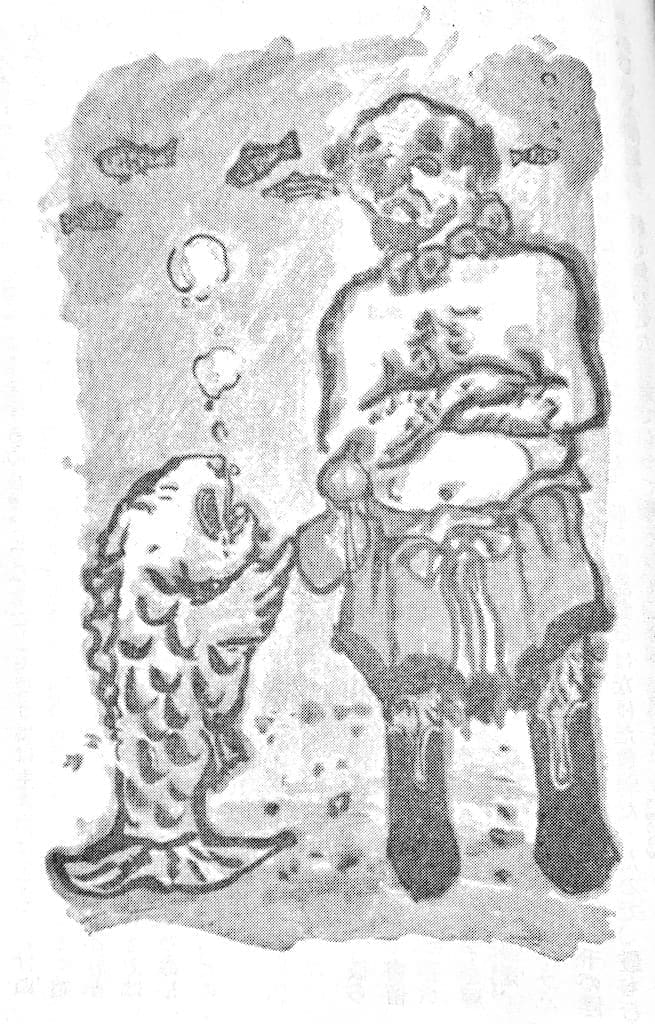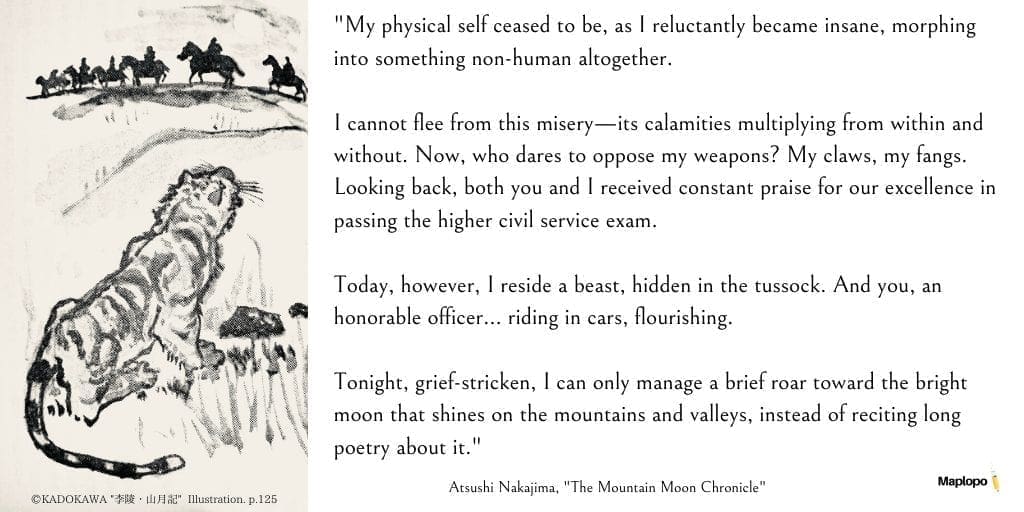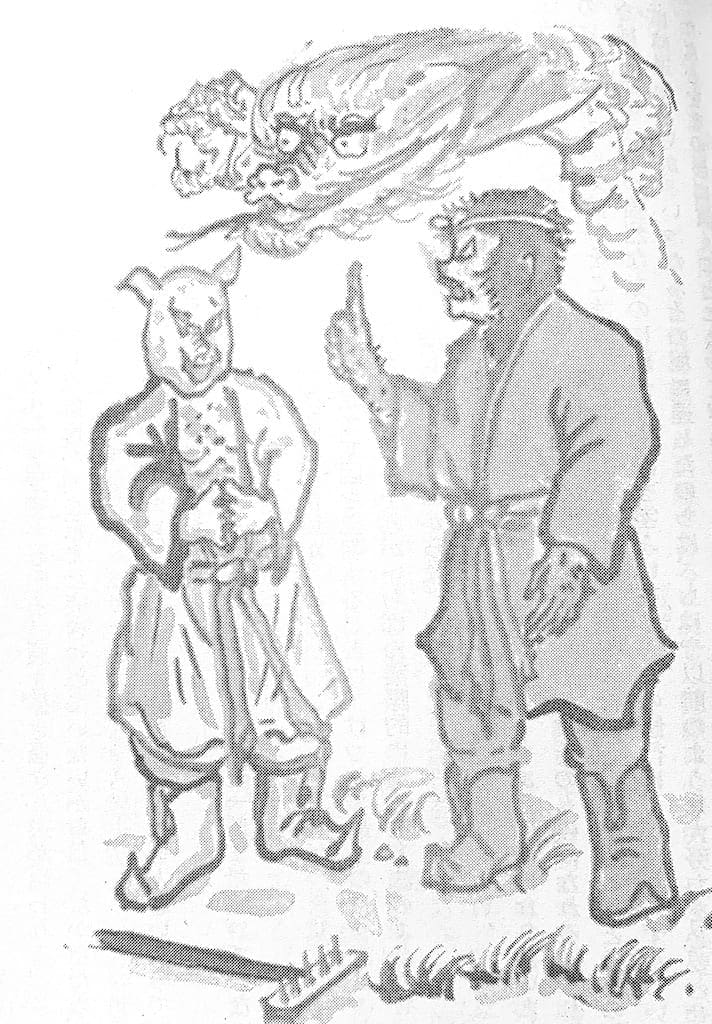A Maplopo Aftertalk
—Nakajima Atsushi, Part II


(c)KADOKAWA 『李陵・山月記』Illustration, p.133
Doc (D) and Reiko (R)
“When you’re young, and you read the story, do people enjoy that story?”
R: I like “悟浄出世 (Gojo Rises)” and “悟浄歎異 (Gojo Contemplates)” a lot. Both stories feature a character named Gojo. He’s an ugly monster and he struggles through his ascetic journey trying to find meaning in life. He holds Goku, the monkey character, in high esteem but is envious of him because Goku is very charismatic and innocently whimsical, whereas he finds himself in constant contemplation and wonders, “Why am I so introspective about everything?” I can’t remember any exact moments or specific lines off the top of my head, but a lot of it struck straight to my heart.
D: That’s in the blue book?
R: No… in the Nakajima book.
D: The one we have with the archer on the cover?
R: Yeah.
D: Did you read Nakajima in school?
R: Yeah, “山月記 (Moon over a Mountain Chronicle)”
D: That’s really well-known, right?
R: Yes.
D: Do people like it? When you’re young, and you read the story, do people enjoy that story? Do they get anything out of it, or is it lost on people?
R: I never really understood Nakajima as a teenager, because he uses many kanji that are difficult and not commonly used anymore. You literally have to use the dictionary every two or three sentences. But still, that’s exactly why Nakajima’s works are appealing. They’re hard to get through, but once you get everything he’s trying to say, it really makes sense. It’s very clear and logical. His story lines are very interesting. He’s got good humor too. Like that part… I love that part where Kisho goes on a journey to the west, finally reaches the summit of a rugged mountain, and the person he meets is this old person, as “old as the hills.” Nakajima has this type of humor. The blue book was also saying Nakajima’s writing is like chewing hard stuff like dried squid—very chewy and tough. Nowadays, children like easy things to eat, something you don’t have to chew a lot, maybe like…
D: Hamburger.
R: Yeah, but in the olden days, people were eating crunchy stuff you really had to chew a lot… munch, munch, munch, munch…
D: [laughter]
R: Like brown rice and stuff. So, Nakajima is like that. You really have to chew a lot to enjoy the real taste of it. It’s not something you can read casually while lying on the bed, because you need a dictionary.
D: Do you think people back in the day when they were originally reading Nakajima—did they need a dictionary back then too?
R: I don’t know… but back then, I think people were more educated in general—more familiar with the kanji.
D: Maybe not as much dictionary usage.
R: Yeah, I would imagine… So, what did you like?
D: I get crazy about the cinematic nature of it. I love the parts where there’s a… sequence to the themes. “This happens. Then, this happens. And then this… and, this.” As a writer, I love the challenge of trying to make that flow quickly—or move quickly—and capture every moment. I remember you talked earlier about drawing pictures. I remember that arrow scene… and you drawing one arrow penetrating the other… it really helped me put that scene together in my mind because… I mean… it’s difficult to… in the original Japanese, probably, to explain that. But, you’re able to visually map it out for me. And I was able to, then, map the language to the visual you were giving me. But, I love how it’s totally like anime. I can see this as a movie. It really feels like it moves. So, it’s a parable, like he says, and it’s a journey. A typical kind of story that we tell over and over throughout time.

“What about the author’s approach of creating such an unpredictable conclusion like that?”
R: I have a question. So, the ending is… I bet it’s surprising to you. The ending of this journey. Did it really make sense to you the very first time you read it?
D: It’s abrupt, I feel. He introduces it as a tale… and he builds it up like it’s kinda this unique thing, and it feels a little bit like it ends abruptly.
R: Not the abruptness, per se, but this idea of Kisho forgetting things… Kisho losing his passion… forgetting what a bow is.
D: That was definitely confusing for me. This is what you were trying to explain in that meeting a long time ago when we were across the table from one another. Yeah, definitely difficult for me to understand, even after reading this story and even after you and I talking about it so much, it’s still not quite clear in a way. How could he forget about the bow and arrow? Your explanation of how it was possible that he could forget about that, is what has made it more possible for me to understand it. I think, if you look at this from a purely logical, Western kinda view, it’s difficult to get in a single read. You kinda start thinking, “That’s bullshit.” How could you forget this thing you’ve striven to achieve for years, for your whole life…?
R: What about the author’s approach of creating such an unpredictable conclusion like that? I wonder if readers of English can appreciate what I was able to appreciate. If you’re not exposed to this culture or you’re not familiar with this kind of idea, can you really be pleased with the conclusion of the story as I was? With this excitement of, “Ohhhhhh! Wowwww!” Or, does it just confuse the reader like you said. I wonder about the reaction to the resolution Nakajima provides.
D: That’s a good question. It’s my hope we did justice to the story overall so the reader gets the message no matter how inherently confusing it might be. Mmm, I don’t think it’s lost. I hope it’s not lost. So, your feeling is that… one of wonder, I guess?
R: Yeah… if this concept of liberation is new to someone… the concept of getting rid of your ego… one might find such thinking depressing. I remember this particular scene… if you’ve ever watched Before Sunset, where they’re talking and the female character says, “Zen monks… aren’t they depressed?” because they get rid of desires. They think desire is a bad thing. They’re free from suffering by getting rid of their desires. And she says, “Isn’t that depressing?” And it’s very true. If you become wooden-like, then why live? But somehow, this perspective is considered worth meditating on in some schools of thought.
D: Certainly, a Japanese way of thinking, right? The absence of everything.
R: Nothingness.

(c)KADOKAWA 『李陵・山月記』Illustration, p.165
“I don’t get it!” Okay, the fact that you don’t get it means you are on the right course.”
D: That’s hard for us to grasp, I think. Remember I told you this story about going to the temple and asking the monk, “How do I balance this want if I’m not supposed to want anything? In order to succeed or accomplish things, I have to want those things, right? So how do I want those things, and yet still be free of want?”
R: Contradiction, right there.
D: It’s so difficult to understand. He said you have to want those things for everyone. That was his answer. You want happiness for everyone. Health for everyone. Don’t just ask for yourself. Yeah, it’s tricky… I think probably in the end, some of this is probably still confusing for a Western reader. But, that’s okay. Because, if you’re really wanting to learn and wanting to grow as a person, the confusing aspect of it should drive you to learn more. So, it’s intentional in a way—Buddhist… I forget the word, but… these Buddhist sayings that make no sense, right? The whole idea is to get you to think about it.
R: Ahhh, that’s a good point… yeah, a riddle.
D: Exactly. “I don’t get it!” Okay, the fact that you don’t get it means you are on the right course. Keep thinking about it.
R: Yes! It makes you think. If you get an answer right away, then you don’t need to even think about it.
D: Precisely. And, the irony of that is when you get the answer right away, you’ll forget about it. You have to really fight and fight. “What is the real answer?” And then you get to a real understanding of what it is, and it sticks with you. Think about math. If you know the answer to certain things in math, you quickly forget them, right? You kinda have to bust your ass to get to a place.
R: For sure… umm… we’ve been talking for a quite long time now… Should we wrap up?
D: Should we, now? So, Nakajima… More than just a story about an archer. It’s thought provoking.
R: Yes. I’m so glad that finally I could tell… the very purpose of this effort was because I wanted to share the story with you. And, we ended up sharing it with so many people. I’m super happy about that. I hope people enjoy the story.
D: I’m sure they will. Yeah, this came out of a little coffee shop sidebar in a way. It turned into a rather beautiful tale. I’m glad. Thank you for sharing with me.
R: Thank you.